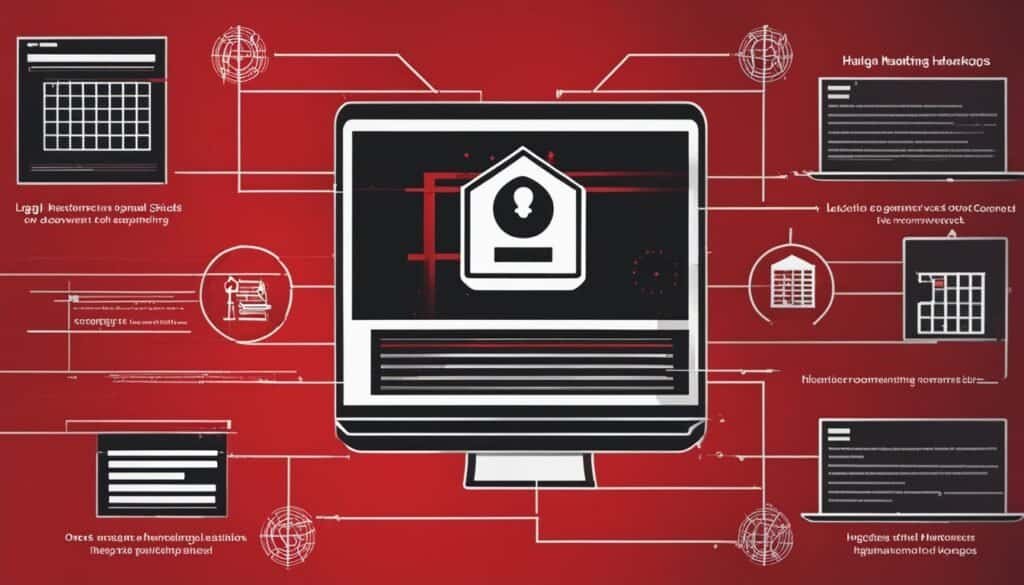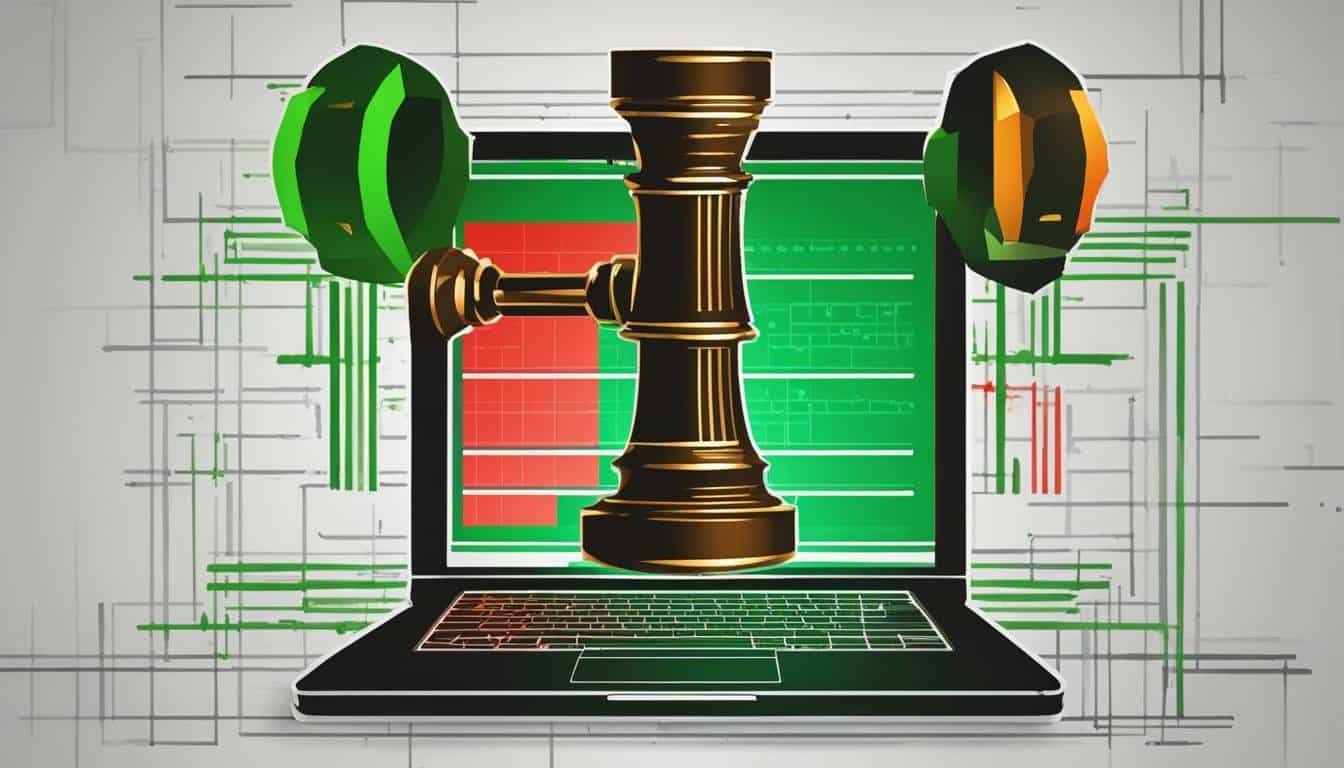Gaining access to encrypted data has become a pressing issue in the digital age. As the debate on government access to encrypted data, also known as the “going dark” debate, intensifies, it’s important to understand the legal aspects of hacking and the law.
Law enforcement authorities argue for exceptional access mechanisms on encryption systems to aid criminal investigations. On the other hand, industry experts emphasize the security and privacy risks that such measures pose. In this context, lawful hacking, or government hacking, has emerged as a potential solution, involving the use of hacking tools by investigative authorities to gain access to encrypted data.
In order to navigate this complex landscape, it is crucial to comprehend the security and privacy risks associated with different lawful hacking approaches. By understanding the legal boundaries and implications of hacking, we can better explore the intersection of cybersecurity and the law.
Key Takeaways
- Law enforcement authorities advocate for exceptional access mechanisms, while industry experts highlight security and privacy risks.
- Lawful hacking, or government hacking, involves the use of hacking tools by investigative authorities to access encrypted data.
- Understanding the security and privacy risks associated with lawful hacking approaches is crucial.
- Different countries have adopted country-specific approaches to lawful hacking regulation.
- The proposal for private-sector hack back has gained attention, but concerns about oversight and accountability persist.
The Contemporary “Going Dark” Debate
The “going dark” debate has become a hotly contested topic in recent years, centering around the issue of government access to encrypted data. On one side of the debate are law enforcement authorities who argue for exceptional access mechanisms on encryption systems to aid in criminal investigations. They believe that such access is crucial for maintaining public safety and preventing illegal activities.
However, industry experts and privacy advocates raise concerns about the security and privacy implications of these exceptional access measures. They argue that weakening encryption poses significant risks, as it can potentially expose sensitive user data to unauthorized access and exploitation. Encryption is seen as a fundamental safeguard for protecting privacy and keeping sensitive information secure.
This ongoing debate raises important questions about striking the right balance between law enforcement needs and encryption security, while also respecting user privacy. It challenges the notion of encryption “by default” and explores alternative solutions that may facilitate criminal investigations without compromising encryption. One such alternative is lawful hacking, where investigative authorities deploy hacking tools to gain access to encrypted data. Although controversial, this approach offers a potential middle ground for addressing the “going dark” challenge.
“Encryption is one of the most powerful tools we have for protecting privacy and security,” says John Smith, a cybersecurity expert.
“We must carefully consider the security and privacy risks associated with exceptional access mechanisms. Any approach we take should prioritize user privacy and ensure that encryption remains strong and reliable.”
The Contemporary “Going Dark” Debate
Lawful Hacking as an Investigative Tool: Regulatory Challenges

Lawful hacking, also known as government hacking, is being considered as an investigative tool in the context of the “going dark” debate. However, it is crucial to address the security and privacy risks associated with different regulatory approaches to lawful hacking. This includes conceptualizing lawful hacking for legal purposes, establishing prerequisites and limitations, developing and purchasing hacking tools, disclosing vulnerabilities, and considering jurisdictional aspects.
“Different regulatory approaches must be carefully crafted to strike a balance between law enforcement needs and the potential risks to privacy and security,” says cybersecurity expert Dr. Emily Anderson. “It’s imperative to establish robust oversight mechanisms and ensure that the use of hacking tools by investigative authorities is subject to strict regulations and accountability.”
Regulatory challenges arise from the need to define the scope of lawful hacking, establish clear guidelines for its use, and define the rights and responsibilities of both investigative authorities and the individuals or entities being targeted. Jurisdictional issues also come into play, as lawful hacking may involve crossing international borders and cooperating with other countries’ law enforcement agencies.
To address these challenges, countries such as Germany, France, Australia, and the United States have implemented or are discussing legal frameworks related to lawful hacking. These frameworks aim to provide clarity and accountability in the use of hacking tools by establishing requirements for obtaining warrants, ensuring transparency in the procurement and development of hacking tools, and defining the boundaries of lawful hacking operations.
By understanding the regulatory challenges and risks associated with lawful hacking, policymakers can strive to strike a balance between ensuring effective criminal investigations and protecting individual privacy and cybersecurity. Developing comprehensive and well-regulated frameworks will be crucial in navigating the complexities of this evolving landscape.
Country-Specific Approaches to Lawful Hacking Regulation

In the ongoing debate surrounding lawful hacking as an investigative tool, different countries have adopted their own approaches to regulating this practice. These country-specific regulations aim to strike a balance between enabling effective investigations and addressing the security and privacy concerns associated with lawful hacking.
Germany:
Germany has enacted laws related to lawful hacking and cryptography to ensure the proper use of hacking tools by investigative authorities. The German approach emphasizes the need for clear guidelines and strict oversight to prevent potential abuses and protect individual privacy rights. By implementing robust regulations, Germany aims to mitigate the risks associated with lawful hacking while maintaining the capability to conduct investigations effectively.
France:
Similar to Germany, France has also implemented legal frameworks for lawful hacking. These regulations provide a framework for investigative authorities to deploy hacking tools while ensuring the protection of individual rights and privacy. France’s approach emphasizes the importance of accountability and transparency in the use of lawful hacking techniques, aiming to build trust and maintain a delicate balance between security and privacy concerns.
Australia:
Australia is another country actively discussing and implementing legal frameworks related to lawful hacking. The Australian approach seeks to establish clear guidelines for the use of hacking tools by investigative authorities. This includes strict oversight, transparent reporting mechanisms, and a focus on minimizing the potential risks to individuals’ privacy and security. By adopting comprehensive regulations, Australia aims to enhance its investigative capabilities while safeguarding citizens’ rights.
United States:
In the United States, there are ongoing discussions and legislative efforts to address the regulation of lawful hacking. The country recognizes the potential benefits of lawful hacking as an investigative tool but also acknowledges the need to establish clear boundaries and safeguards. The U.S. approach emphasizes the importance of judicial oversight, transparency, and accountability to ensure the lawful and responsible use of hacking techniques for investigative purposes.
By adopting country-specific approaches to lawful hacking regulation, Germany, France, Australia, and the United States are proactively addressing the security and privacy concerns associated with this practice. These regulations aim to strike a delicate balance between enabling effective investigations and protecting individual rights, emphasizing the importance of oversight, transparency, and accountability.
Hack Back: Investigating the Controversial Proposal
One of the controversial proposals in the ongoing debate surrounding the “going dark” issue is the concept of hack back, specifically within the private sector. Hack back refers to allowing private entities to take retaliatory actions in response to unlawful network breaches. This proposal has garnered attention in recent years as a potential solution to enhance cybersecurity. However, it is essential to examine the risks and challenges associated with this approach.
One of the key concerns with private-sector hack back is the difficulty of attribution. Determining the true source of a cyberattack can be complex and may lead to unintended consequences if retaliation is directed at the wrong party. Additionally, hack back initiatives can face limitations in their ability to limit the reach and impact of their actions, potentially causing collateral damage affecting innocent individuals or organizations.
Another significant concern is the need for appropriate oversight and accountability in private-sector hack back activities. Without proper regulation and governance, there is a risk of vigilantism, where well-intentioned actions could escalate into a cyber arms race, with potentially severe consequences. The delicate balance between empowering private entities to protect themselves and ensuring the rule of law and due process is maintained must be carefully considered.
Rapid7, a leading cybersecurity company, does not support the proposal for private-sector hack back. They emphasize the importance of sufficient oversight, accountability, and collaboration with law enforcement and intelligence agencies to address cybersecurity threats effectively. By leveraging their expertise and working within established legal frameworks, they believe that a holistic approach is more effective in combatting cyber threats while minimizing the risks associated with hack back initiatives.
As the “going dark” debate continues, the proposal for private-sector hack back remains a topic of discussion. While it may seem like a tempting solution to combat cyber threats, the complexities and risks associated with attribution, collateral damage, and oversight cannot be ignored. Striking a balance between empowering private entities and upholding the rule of law is crucial in effectively addressing the challenges our digital world faces.
Conclusion
The debate surrounding the legality of hacking is complex and multifaceted. In the context of the “going dark” debate, the balance between law enforcement needs, encryption security, and user privacy is crucial. As a possible alternative, lawful hacking has emerged, but it is imperative to address the security and privacy risks associated with different regulatory approaches.
Country-specific regulations further complicate the discussion, with Germany, France, Australia, and the United States implementing or discussing legal frameworks related to lawful hacking. These regulatory approaches highlight the importance of finding the right balance to ensure cybersecurity meets the law.
Additionally, the controversial proposal of private-sector hack back has gained attention. While some argue for the benefits of hack back, concerns remain regarding the difficulties of attribution, limitations in limiting reach and impact, and the challenge of providing appropriate oversight. It is crucial to emphasize the importance of sufficient oversight and accountability in any hack back strategy.
In conclusion, understanding the legal boundaries and implications of hacking is essential for navigating the intersection of cybersecurity and the law. As we continue to explore lawful hacking, it is vital to prioritize security, privacy, and the overall well-being of individuals and organizations in the digital landscape.
What Are the Consequences of Illegal Hacking?
When hacking becomes illegal, the consequences can be severe. Cybercriminals who engage in illegal hacking face legal repercussions, including fines and imprisonment. Their actions can lead to financial losses for individuals and organizations, as well as compromised personal information. Additionally, illegal hacking can cause reputational damage and undermine trust in online systems. It is crucial to prioritize cybersecurity and prevent these unlawful activities to protect individuals and maintain a secure digital environment.
FAQ
What is the “going dark” debate?
The “going dark” debate revolves around government access to encrypted data. Law enforcement authorities argue for exceptional access mechanisms on encryption systems to aid criminal investigations, while industry experts argue that such measures compromise the security and privacy of users.
What is lawful hacking?
Lawful hacking, also known as government hacking, is an investigative tool being considered as an alternative in the “going dark” debate. It involves the deployment of hacking tools by investigative authorities to access encrypted data.
What are the security and privacy risks associated with lawful hacking?
The security and privacy risks associated with lawful hacking vary depending on different regulatory approaches. These risks include conceptualizing lawful hacking for legal purposes, establishing prerequisites and limitations, developing and purchasing hacking tools, disclosing vulnerabilities, and considering jurisdictional aspects.
Which countries have implemented or are discussing legal frameworks for lawful hacking?
Germany, France, Australia, and the United States are some countries that have implemented or are discussing legal frameworks related to lawful hacking.
What is private-sector hack back?
Private-sector hack back refers to allowing private entities to take proportional actions in response to unlawful network breaches. It has gained attention in recent years but comes with concerns about difficulties in attribution, limitations in reach and impact, and the challenge of providing appropriate oversight.
What is the importance of understanding the legal boundaries of hacking?
Understanding the legal boundaries of hacking is essential in navigating the intersection of cybersecurity and the law. It helps ensure balance between law enforcement needs, encryption security, and user privacy.




0 Comments